sina li tawa ala e sina. kon li tawa e sina.
You don't move yourself. The air moves you. — Toki Ponist Pu
July 2021
These are the words as recovered from the awoken well:
jan Puniko li pali wawa lon kon wawa sinpin.
jan Walala li pali ala lon kon wawa monsi.
ona li pini lon tenpo sama.
ona li toki e ni: jan seme li pona li ike?
jan Sipi toki e ni: kasi li pona.
Here follows a relaxed translation:
Walala and Puniko held a race. Puniko traveled against the wind and worked hard. Walala traveled with the wind and did nothing. They arrived at the exact same instant. “Who won?” they both asked Tipi who was referee. Tipi said: “The trees won.”
Associative musings:
Free will is one of those concepts that is thought to be illusory, non-existant or elementary. I suppose it is all of them, depending on your perspective on things. Be mindful that objectively it may very well be that all of nature is causally connected in either a determined or completely random way, which rules out the idea that there is an outside agent (the self) that can choose its outcome. This is also true if it is found there is a healthy combination of determination and randomness.
This objective statement has no bearing to the righteous believe that we have agency or free will, because that is what we experience when we make our choices and see our body take actions. Not believing in free will does not change anything if there is none, but may be a choice that has an impact on your actions in the future if you do have one. It is then often not unwise to keep believing in your own agency, while accepting that it does not exist objectively. But be also aware that we often let go of this feeling of agency anyway when we let our subconscious guide us or states above that.
When building and organizing our institutions such as the judicious system, all of these can be taken into account. It is probably safe to prevent others in society by removing a violent agent. Lack of free will does not exhonerate this person from that. Blame and punishment may be more carefully balanced by focusing more on the eventual effect is has on the person and society than on the torture of a non-existant free agent.
Read a newer koan (Strong words destroy the strength of the object.)
Read an older koan (Even good fish have to swim in the dirty water of others.)
